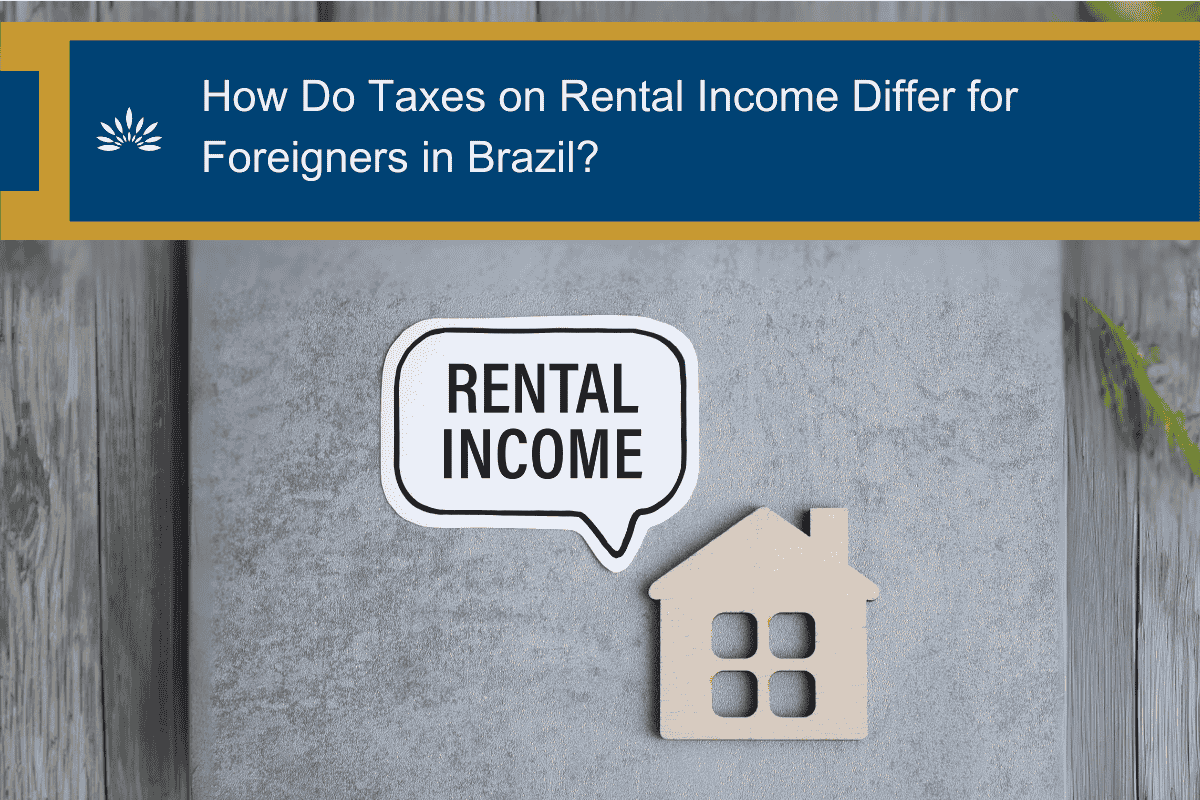Navigating Rental Income Taxes in Brazil for Foreign Owners
Are you torn between a brand-new development or a ready-to-live-in property to secure your visa? This article breaks down everything you need to know about both routes—pre-construction and resale—so you can invest wisely and fast-track your immigration goals. Keep reading to discover how to make the most of your real estate purchase while staying compliant with Brazil rental property taxes and foreign landlord taxes.
Imagine you’re in a cozy café in Rio de Janeiro, sipping on a cup of Brazilian coffee, and you overhear two friends discussing their latest real estate ventures. One is a Brazilian resident who’s been renting out apartments for years; the other is a foreign investor who lives abroad and just bought a beachfront property. Their main concern? Ensuring taxes on rental income in Brazil are handled correctly to avoid potential pitfalls.

Looking for Expert Guidance? Let Us Help!
[email protected]
+55 (21) 4042-0633
+1-214-438-3777
How Do Taxes on Rental Income Differ for Foreigners in Brazil?
Brazil offers an exciting market for those looking to invest in rental properties, but paying rental income taxes can feel daunting if you’re unfamiliar with local rules. From navigating the tax rate for rental income to keeping the right property tax statements, there’s much to consider—especially if you live overseas. This comprehensive resource will walk you through the nuances of tax on rental property in Brazil, focusing on what foreigners need to know about income taxes and rental income for tax purposes.
By the end, you’ll understand how to stay compliant, what documents to maintain, and how a lawyer or property manager can simplify the process. Let’s dive right in, including an overview of the potential effective tax rate you might encounter as a non-resident and how overseas rental tax in Brazil could differ from your home country’s approach.
Understanding the Basics of Tax on Rental Property
In Brazil, your residency status primarily determines how your rental income taxes are calculated. If you are considered a tax resident (e.g., staying more than 183 days in a 12-month period, holding a permanent visa, etc.), you fall under a progressive tax system. Non-residents typically encounter a flat withholding tax on rental income, often between 15% and 25%. Knowing how to file taxes for rental property can hinge on this distinction.
Resident vs. Non-Resident Landlords
Residents: Must aggregate rental income with their global earnings in their annual tax return, benefiting from potential deductions (including possible property taxes and maintenance costs). Their total annual income determines the bracket for their progressive rates.
Non-Residents: Often face withholding on rental income, with a monthly flat rate deducted by the tenant or a local property manager. This can be simpler but may result in a higher effective tax rate, depending on your total earnings.
Key Components of Paying Taxes on Rental Income
Below are essential steps for any landlord in Brazil, whether dealing with Brazil rental property taxes as a resident or a non-resident:
- Obtain a CPF: Required for tax-related activities and real estate ownership.
- Keep Detailed Documentation: Include property tax statements, rent receipts, and expense records.
- Identify Filing Requirements: Non-residents often rely on monthly withholding, whereas residents must file annually.
- Engage a Professional if Needed: A local property manager or specialized lawyer can help ensure compliance, especially if foreign landlord taxes in your home country interact with Brazilian rules.
Tax Rate for Rental Income: Resident vs. Non-Resident
Residents: Pay progressive rates (0% to 27.5%) on worldwide income, determined by your total annual income.
Non-Residents: Often face a 15% to 25% withholding tax on rental income, deducted monthly and treated as the final payment in many cases. This can simplify matters but may reduce flexibility in claiming deductions.
What Counts as Rental Income for Tax Purposes?
Brazil generally considers all money received from tenants (base rent, certain fees, etc.) as part of taxable rental income. Condominium fees and utilities paid directly by tenants may not count toward your rental income for tax purposes. Keep clear records if you collect these charges yourself.
How to File Taxes for Rental Property in Brazil
- Determine Your Residency Status: Whether you surpass 183 days in a 12-month period.
- Gather Necessary Documents: CPF, property tax statements, rent receipts, and expense records.
- Monthly vs. Annual Filing: Residents must file annually; non-residents may rely on withholding but can file if they want to claim deductions. This is crucial knowledge when learning how to file taxes for rental property.
- Submit Through Receita Federal: You can file online or appoint a representative (lawyer or accountant) in Brazil.
Looking for Expert Guidance? Let Us Help!
[email protected]
+55 (21) 4042-0633
+1-214-438-3777
Common Deductions and Strategies to Reduce Tax
Even non-residents can leverage certain deductions. Major repairs and maintenance costs may be deducted if you keep receipts. If you pay IPTU or use a property manager, those might also be deductible. Check whether your home country has a tax treaty with Brazil to avoid double taxation, especially if you’re grappling with foreign landlord taxes or Brazil property tax for foreigners.
Avoiding Pitfalls When Paying Taxes on Rental Income
- Neglecting the CPF Requirement: A CPF is mandatory for property and tax matters.
- Mixing Personal and Rental Finances: Keep a clear paper trail.
- Missing Deadlines: Watch for monthly withholding and annual return deadlines.
- Inadequate Documentation: Save receipts, repair invoices, and all relevant statements for Brazil rental property taxes.
Real-Life Scenarios
Scenario 1: Lucy from Canada owns an apartment in São Paulo but lives in Montreal. As a non-resident, her tenant withholds 15% monthly. With no additional complexities, she skips the annual return.
Scenario 2: Carlos, an Argentine living in Rio, surpasses 183 days, making him a resident. He combines rental and salary income under the progressive tax system, potentially paying less overall than a flat 25% rate.
Scenario 3: Andrea from Spain became a resident mid-year after spending more than 183 days in Brazil. She had to adjust her filing approach and consult a lawyer to avoid double taxation in Spain.
Comparison Table: Resident vs. Non-Resident Landlords
| Aspect | Resident Landlords | Non-Resident Landlords |
|---|---|---|
| Tax System | Progressive tax system (0%–27.5%) on worldwide income | Flat withholding tax on rental income (commonly 15%–25%) |
| Obligation | Must file an annual tax return to report all income | Monthly withheld amount often serves as final payment |
| Deductions | Can deduct repairs, property taxes, etc. | Some deductions possible but more limited |
| Documentation Needed | Annual income declarations, property tax statements | Monthly rent receipts showing withheld tax |
| CPF Requirement | Already holds a CPF | Must obtain CPF before renting |
| Flexibility | Potentially lower rates if total income is modest | Predictable but sometimes higher overall rate |
| Handling | Usually hires an accountant for annual return | Often relies on tenant/property manager for monthly withholding |
Conclusion: How Do Taxes on Rental Income Differ for Foreigners in Brazil?
It ultimately comes down to your residency status. Non-residents face a withholding tax on rental income at a flat rate—often simpler but sometimes higher. Residents fold rental proceeds into their total annual income, benefiting from possible deductions. Whichever category you fall into, remember the basics: secure a CPF, keep thorough records, and consult local professionals like Oliveira Lawyers for legal guidance or Camila Saunier International Realty for real estate questions. Whether you refer to it as foreign landlord taxes, Brazil property tax for foreigners, or overseas rental tax Brazil, the key is understanding how the system applies to you.
What’s your biggest concern about investing in Brazil? Let us know in the comments!
For professional support, contact Camila Saunier International Realty to explore your real estate options or Oliveira Lawyers for legal assistance. Together, they’ll help make your Brazilian property dreams a reality.
Frequently Asked Questions (FAQs)
1. Do I need a CPF to own rental property in Brazil if I live abroad?
Yes. A CPF is mandatory for any financial or tax-related activities in Brazil, including rental income for tax purposes. You can obtain one at a Brazilian embassy or consulate in your home country.
2. Is the withholding tax on rental income always a flat rate for non-residents?
Generally, yes. Non-residents face a withholding tax on rental income at a set rate, often between 15% and 25%. This withheld amount is typically considered the final tax, though annual filings may still apply in certain cases.
3. How does Brazil’s progressive tax system work for rental income if I’m a resident?
If you’re classified as a resident, your tax on rental property is added to your worldwide income and taxed at progressively higher rates (0% to 27.5%). Your exact bracket depends on your total annual income and eligible deductions.
4. Which documents are crucial for filing rental income taxes in Brazil?
You’ll need property tax statements, rent receipts, invoices for repairs or maintenance, and any forms showing monthly withheld taxes. Organizing these materials is essential for accurate filing and potential deductions.
5. Can I deduct the fees I pay to a local property management company?
Often, yes. If the fees are directly related to managing your rental, they might be considered a legitimate expense. Consult the latest regulations and consider seeking advice from a qualified lawyer or accountant.
6. How to file taxes if my tenant fails to withhold the correct rental tax?
Ultimately, you’re responsible for ensuring the correct tax on rental property is paid. If your tenant doesn’t withhold properly, you may need to file an annual return to settle any underpayment. Penalties or interest could apply if not rectified.
7. Do I need to file an annual return if I’m a non-resident with one property?
It depends. If the monthly withheld tax covers your liability and you have no additional income or deductions, you might not need to file annually. However, it’s wise to confirm with a professional or the Receita Federal.
8. What if I become a resident mid-year?
If you surpass the 183-day threshold, your status changes. You’ll report income differently for the part of the year you were a non-resident vs. the part you were a resident. Proper documentation and possibly professional help are crucial.
9. Are maintenance and repair costs deductible?
Yes, in many cases. Routine repairs and certain maintenance costs may reduce your tax rate for rental income if documented properly. Non-residents might have stricter rules, so confirm eligibility before claiming these deductions.
10. Can I avoid double taxation if I already pay taxes in my home country?
Potentially. Brazil holds tax treaties with various nations, which can help you claim foreign tax credits or exemptions. Check if your home country has a treaty and consult a professional to leverage it fully, especially if dealing with overseas rental tax Brazil.
11. What is the best way to handle property taxes like IPTU?
If you pay IPTU yourself, keep your property tax statements for potential deductions. If your tenant covers the IPTU directly, you generally don’t include that amount as part of your rental income for tax purposes.
12. Is hiring a property manager mandatory for non-residents in Brazil?
Not mandatory, but highly recommended. A property manager or local property management company can simplify rent collection, ensure proper withholding, and handle maintenance. This setup is especially beneficial if you live abroad.
Looking for Expert Guidance? Let Us Help!
[email protected]
+55 (21) 4042-0633
+1-214-438-3777





